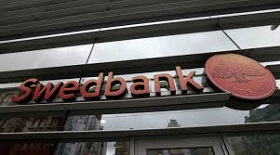EU – Baltic States, Financial Services, Legislation
International Internet Magazine. Baltic States news & analytics
Thursday, 15.01.2026, 01:39
Swedbank: Information insufficient to respond to media accusations
 Print version
Print version |
|---|
The bank says it has complied with all relevant anti-money laundering regulations.
We do not know about those 50 customers and the alleged number -- 40 bn kronor -- does not sound familiar, either, Bonnesen told the media. SVT has not shared the information serving as basis to its allegations; Bonnesen said, however, that Swedbank is interested in any information that would help the bank to better identify suspicious transactions.
Bonnesen added that money laundering is the biggest problem concerning all banks in the sector and in all countries over the world. She added, however, that the specific risk for laundering activities in Swedbank is relatively lower due to the bank's choice of business model.
"Our focus is retail banking in our domestic markets. International transactions are not our main business model. Among our customers, non-residents account for around 1 percent and most of them are residents of the European Union," Bonnesen said.
She added that the statistics on international payments do not point to money laundering, either, as they have remained stable throughout the years, and the changes that have occurred have been in line with those relating to the economy. Additionally, the relative figures in Estonia, Latvia and Lithuania have been comparable.
According to the Swedish public broadcaster SVT, extensive and systematic money laundering is suspected to have taken place at Swedbank, which lasted for nearly a decade and was connected with the Baltic units of Danske Bank.
The investigative journalism TV program Uppdrag Granskning said that at least 40 billion Swedish kronor or some 3,8 bn euros moved between Swedbank and the Baltic units of Danske Bank.
SVT reported that the transfers with a suspicion of money laundering took place in 2007-2015. Among some 50 customers are shelf companies and corporate customers, who had no business activities.
The share of Swedbank fell by 10,8% to 188,1 Swedish kronor by Wednesday noon after Swedish media published news that the bank was linked with the Danske Bank money laundering case.
The Estonian Financial Supervision Authority (FSA) said that the suspected money laundering at Swedbank is an assessment by a media program, which has yet to be confirmed or refuted by investigative authorities,
Like any other bank's, Danske's operations have not been isolated from the rest of the financial system, spokespeople for the Estonian financial watchdog said.
"There are certainly payments received from other banks as well as those made to other banks; thus, said payments may regard many banks, including those of the states of the European Union. The same goes for money of suspicious origin, too," the Estonian FSA said.
FSA added that it neither automatically means nor precludes, however, that the bank receiving payments in the alleged money laundering case has committed a crime or violated any know-your-customer requirements it is subject to.








 «The Baltic Course» Is Sold and Stays in Business!
«The Baltic Course» Is Sold and Stays in Business!

